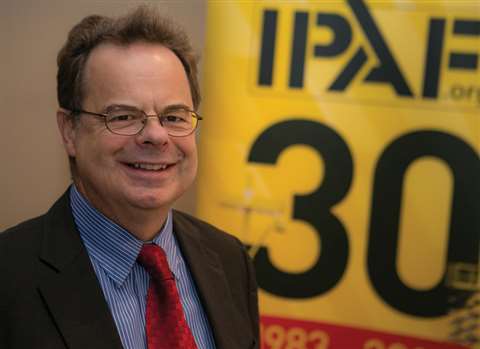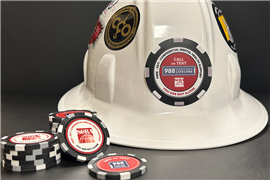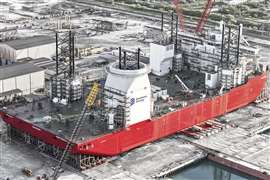Interview: IPAF's Tim Whiteman
14 November 2014

The International Powered access Federation (IPAF) was set up in 1983 as a not-for-profit members’ organisation representing manufacturers and distributors, as well as rental companies, training companies and equipment users.
The core aim of IPAF is to promote the safe and effective use of powered access worldwide, and the organisation now has 1100 members in 52 countries. CEO Tim Whiteman said the drive to internationalise the operation had gone hand-in-hand with the spread of aerial work platforms (AWPs) into new markets.
“I’ve been involved with the industry for over 20 years, but 30 years ago I was living in London, UK, and you never saw this equipment. And now mobile elevated work platforms [MEWPs – another term form AWPs] are everywhere.
“The industry has grown phenomenally and is still growing fast, but is not a mature industry. Having said that, it is a very responsible industry – the fact a group of essentially competitors could all get together to create IPAF demonstrated how responsible this industry is.”
Mr Whiteman explained that the roots of IPAF were in the UK, where the organisation has a bedrock of 400 members. However, he said the organisation's emphasis on international expansion was growing.
“When I joined IPAF, about 10% of our members were outside the UK and it’s now about 70%,” Mr Whiteman said. “We’ve had a French president, an Irish president and it looks like we’ll have an American president in 2015.
“When it comes to emerging markets, it’s not a challenge to get people in the industry to listen – in fact they come to us. In China, for instance, we have 15 members. In India, we’ve just created an IPAF India council – a group of members who said they wanted to meet regularly and talk about promoting safety.
“The same thing happened in Brazil; people came to us from the industry and said that they wanted to get IPAF started. Whereas in India it’s about working with government and creating standards, in Brazil it’s about getting training going, and we now do lots of training in Brazil.”
Essentially, Mr Whiteman said that within the access industry, IPAF was “pushing against an open door”, but he said the work that needed to be done was with talking to contractors, users and governments to get the safety message across.
Training
One of the ways IPAF tries to do this is with training programmes. Mr Whiteman said that, of the 1100 IPAF members, 430 had opted to use its training programme with more than 600 training centres now established (some members have more than one).
“There’s no compulsion, many of our members have their own training programmes as well, but the option is there as a membership benefit to anyone who wants it,” he explained.
“We offer training programmes in ten languages, and the most recent new languages are Cantonese and Mandarin. We just completed our first training in Hong Kong and hope to start up in China at the beginning of 2015,” Mr Whiteman added.
“One of the strengths of IPAF is that we’re really proactive and we’re always trying to be there before government step in. Our policy is to work with government. For example in the UK, we have a great situation where the government required people to be trained but doesn’t actually set up a curriculum and say you must have government training.
“So in the end, industry has chosen IPAF as the training standard, and it is an amazing success story – it’s a voluntary programme that has now been adopted in many countries.”
IPAF also offers E-learning courses in the US, but Mr Whiteman said the organisation insisted that the individual be present for the exams as well for the practical equipment tests. He said one of the organisations aims for 2015 was to launch a “vastly improved” E-learning product in the US that would gradually become available in other countries.
“We’ve been working on this system for two years, and plan to launch it in the first half of 2015, eventually making it universally available. One of the benefits of E-learning is that you can reach remote parts of the world where it may not be easy to set up a training centre.”
Another plan for the future revolves around the training of more managers. IPAF has recently launched the MEWPs for Managers course, aiming to provide attendees with the basic information every manager should know about planning, selecting and preparing for the use of MEWPs on sites, from paperwork to logistics.
“You’ll see IPAF getting more involved with this theme of management responsibility,” Mr Whiteman said. “Operators need to be trained, but managers have to support their operators and understand the best way to use MEWPs.
“Trained operators are the experts – they need to trust their instincts. They need to be able to say no.”
This is just a brief snapshot of the many initiatives that IPAF has launched, which also includes lobbying activities, guidance for inspection regimes, standards for rental companies, a range of events around the world, and much more.
But what about the next 30 years? Mr Whiteman said safety would remain at the heart of everything IPAF did.
Blue sky thinking
“IPAF is owned by its members – it’s them that have made IPAF successful, and that give up their time to support increasing safety in our industry,” he said. “For the future I think IPAF would like to see more standardisation on the way equipment is made – at the moment manufacturers have to make one model for the states and one model for Europe for instance.
“On the user side, we believe that the principles in our training programme and ISO standards should be adopted and enforced universally. We believe that this is the basic knowledge you need. As far as rental is concerned, there is no way of guaranteeing that a rental company isn’t hiring out a MWEP to someone who has no training, for instance.
“Apart from anything else, it’s then a sales opportunity to sell some training. But unless governments make it a legal requirement to have a licence, then it’s up to the employer to ensure that the employee is trained to use the equipment. That’s where the buck stops.”
-BOX STORY-
A new breed of training centre
Kompetenzzentrum für Arbeitssicherheit is a Basel, Switzerland-based training centre for access equipment, mini cranes, telescopic handlers and forklifts. Managing director Georg Wyss and his son and administration director Michael Wyss set up the business in 2012 and began training in 2013.
The company offers IPAF training courses together with its own internally-developed courses. “There is a big difference between us and other training centres,” Michael Wyss explained. “Many IPAF centres and other training organisations are formed as part of an existing rental company. We are one of the first companies to be set up just as a professional training centre.”
The operation is run from a smart, modern warehouse in Basel featuring comfortable classrooms and a full practical training course, complete with obstacles and machines. Training is usually split into half day in the classroom and half day on the equipment, or two full days for complete beginners.
“We had a great start in 2013, and have essentially seen training double each year. We’re now the second largest IPAF training centre in Switzerland, and are battling for first place,” Mr Wyss said.
“IPAF is the gold standard in Switzerland when it comes to training. Being a dedicated training centre is an advantage because we can offer tailored training to exactly what the customers want and on the equipment that they will be using. Our trainers are also on the job every day, it is their dedicated focus.”
This is an interview from the November/December issue of IRN. For the full feature, including extra images and box stories, please subscribe to the magazine: http://www.khl.com/subscriptions/






